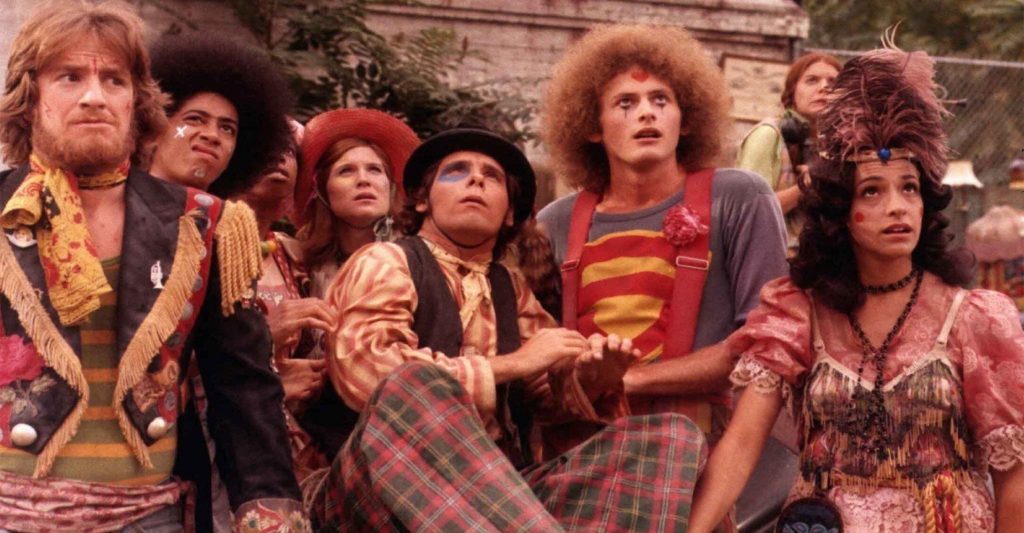
Within two decades of the advent of motion pictures, the life of Jesus had been the focal point of at least one feature-length movie, 1903’s La Vie et la passion du Jésus Christ. While the advent of the musical is a little harder to pinpoint exactly, as it emerged from various other art forms, it still took closer to half a century before we had a musical about the life of Jesus.
Around 1970, there were not one, but two, major musical successes focusing on the life and passion of Jesus. Tim Rice and Andrew Lloyd Webber’s rock opera, Jesus Christ Superstar was written first and produced as a concept album, then in May of 1971 Stephen Schwartz’s Godspell opened off-Broadway. (Jesus Christ Superstar got its Broadway premiere five months later in October of 1971.) Within a few years, both musicals received film adaptations.
Godspell was the only one of those two movies to make the Arts & Faith Top 25 Movie Musicals list, although Jesus Christ Superstar did finish in 27th place. While both musicals (and film adaptations) take inspiration from the Gospel accounts, Jesus Christ Superstar’s form is truly that of an opera with rock music, telling a single narrative story in much the same way an opera would. As a point of contrast, Godspell is more of a concept musical with a series of scenes revolving around a central theme (the Gospel of Matthew).
To the extent that Godspell has a plot, it is simply that a troupe of actors—essentially hippie troubadours—reenact parables from Matthew’s Gospel in 1970s Manhattan, building to the execution of their clown leader (Victor Garber’s Jesus) by the police.
One thing I greatly appreciate about this approach to telling the Gospel of Matthew is that it emphasizes how counter-cultural the teachings of Jesus really were and how much they were and are a call to everyone. That call starts with the opening song, “Prepare Ye” (the way of the Lord) as John the Baptist walks across the Brooklyn Bridge, down streets of New York, and through Central Park. The simple chord progression and repetitive refrain form a catchy tune that the other disciples can easily join.
The disciples remain nameless—after all, Jesus had many more than just the twelve apostles—with one exception. John the Baptist and Judas are both played by David Haskell. When this transition from the herald of the Messiah to the apostle who betrays Him happens isn’t initially apparent, but it is quite striking to see the same person who initiated the following of Jesus be the one who walks away from the acting troupe.
While it is very clear that the same actor is playing two roles and not that John the Baptist and Judas are being conflated, this doubling of characters underscores how one can walk away from a religion that they once celebrated passionately. It creates another parable in a movie made up completely of parables. The pain of Judas’ departure before the finale is apparent for both him and Jesus.
Having watched Judas and Jesus sing counterpoint on Schwartz’s modernized setting of the Beatitudes, “All for the Best,” as they danced in front of billboards in Manhattan, it is clear how much love they both had for one another. At the same time, Judas’ slightly more cynical lyrics show how far the world has to go in implementing the Beatitudes, and the seeds of that frustration ultimately grow into betrayal.
Many Passion dramatizations attempt to humanize Judas or find a more sympathetic motivation for his betrayal of Jesus than the lack of explanation in the Gospels (or the clear animus against him in the Gospel of John). His journey from the most passionate disciple to the most disillusioned in Godspell shows the pain of a loss of faith through a once tight-knit acting troupe being shaken to its core.
However, without Judas’ betrayal the finale would not have been possible. He is the one who leads the police to find Jesus and his hippie troubadours, making it clear that those who executed Jesus were officers in power and not crowds of Jewish people, as misinterpretations of the Gospels have claimed throughout the centuries. Changing Jesus’ execution to a lynching on a chain fence makes an important point: in every act of violence and brutality against a helpless victim, Christ is there alongside that victim. It’s another way of dramatizing the point from Karl Malden’s famous speech in On the Waterfront, “Some people think the Crucifixion only took place on Calvary. They better wise up!”
After the crucifixion, the disciples once again sing “Prepare Ye,” which turns into a medley of reprises. As they carry the body of Christ out into the world, it is clear His challenge and His love are for everyone in every place, and that all the good gifts in our live are opportunities to grow in that love day by day.
— Evan Cogswell (2022)
- Directed by: David Greene
- Produced by: Edgar Lansbury; Kenneth Ott
- Written by: David Greene; John-Michael Tebelak
- Music by: Stephen Schwartz
- Cinematography by: Richard G. Helmann
- Editing by: Alan Heim
- Release date: 1973
- Running time: 103 minutes
- Language: English
Arts & Faith Lists:
2022 Top 25 Movie Musicals == #6